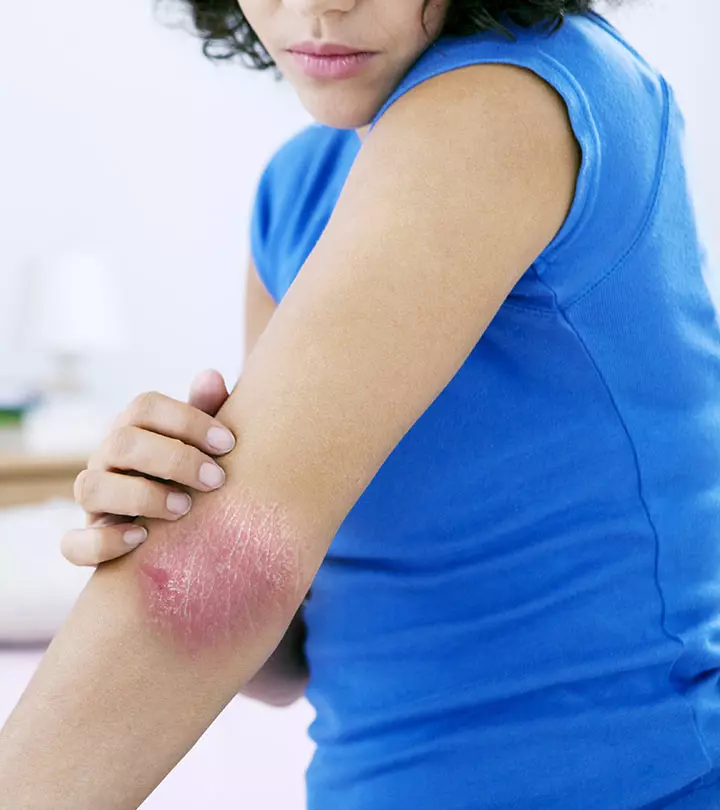Psychosomatic Disorder: Causes, Symptoms, Types, And Treatments
Your mental and physical well-being are interconnected – pay equal attention to both.

Image: Shutterstock
Stress can have a negative impact on both your thoughts and your body. Physical symptoms may develop as a result of worrying about an illness. Such illnesses are referred to as “psychosomatic disorders.” There’s a reason doctors warn you not to get worked up over trivial concerns over and time again. This cautious advice is even more critical if you are sick or have a compromised immune system.
We often hear that psychology is essential in the treatment of disease, and even doctors agree. So, if our good mental health can help us find relief, it’s likely that our bad mental health will impact our physical well-being.
This article discusses how psychology plays an essential role in our physical health and well-being and looks into psychosomatic diseases. Keep reading to find out more.
In This Article
What Is Psychosomatic Disorder?
The term ‘psychosomatic disorder’ is used for a physical disease that is thought to be caused or made worse by mental factors. ‘Psyche’ refers to the mind and ‘somatic’ refers to the physical signs and symptoms that are observed for the disease. Usually, most diseases are psychosomatic as they have mental and physical components.
These disorders may not be present in the same way in every individual. Depending on your mentality and temperament, a physical disease, like a rash or psoriasis, may bother you enough to make you depressed and sick. However, another friend with a similar condition may not feel as depressed or sick as you. The reverse can also be true. For instance, someone with depression may not eat enough or nothing at all. Thus, mental conditions can also lead to physical illness (1, 2).
Psychosomatic disorders include diseases like eczema, stomach ulcers, hypertension, psoriasis, and even heart disease. In fact, a study concluded that depression and anxiety are directly responsible for diseases like myocardial infarction (3).
Let us now look at the physical signs and symptoms of psychosomatic disorder.
Symptoms Of Psychosomatic Disorder
Now that we know that psychosomatic disorders usually begin in the mind, let’s look at the symptoms of this condition. It has many symptoms, including:
- Quickened heart rate
- Palpitation (thumping in the heart)
- Nausea
- Tremors
- Pain
- Dry mouth
- Perspiration
- Chest pain
- Rapid breathing
- Faintness
- Excess fatigue
- A knot in the stomach
- Fast breathing
- Neurologic problems
- Gastrointestinal complaints (1, 2)
Causes Of Psychosomatic Disorder
How mental conditions like depression, anxiety, and stress trigger physical symptoms is not entirely clear. Research is still going on for specific diseases to understand the link between the psyche and the symptoms.
Some reports conclude that increased nerve impulse activity when you are anxious, depressed, or stressed can be one of the contributing factors for the physical symptoms (1, 2). Sometimes, adrenaline and epinephrine releases can also trigger physical symptoms when you are anxious. There have been many studies, and a recent one on how stress causes illness among nurses concluded that burnout is one of the main causes of psychosomatic disorder symptoms like acidity, back pain, neck pain, forgetfulness, and anger (4).
Based on the root cause of the stress and how it is characterizing itself, psychosomatic disorders are divided into different types. These are given below.
[ Read: How Do People Get Pompe Disease ]
Types Of Psychosomatic Disorders
Mostly, psychosomatic disorders and other severe forms are caused by emotional stress. They are divided into these seven types:
(i) Undifferentiated Somatoform Disorder – In this type, you experience one or more symptoms (pain, fatigue, appetite loss, and gastrointestinal symptoms) for a minimum of six months.
(ii) Somatization Disorder – Symptoms include pain, sexual symptoms, gastrointestinal symptoms, neurological symptoms, menstrual symptoms, and fatigue. Seen in people between 18 and 30 years of age, who experience these symptoms for years without any explanation for them.
(iii) Unspecified Somatoform Disorder – Patients falsely believe that they are pregnant because of signs like termination of menstruation, fetal movement, labor pains, nausea, etc.
(iv) Conversion Disorder – Symptoms of this include inability to make a sound, sudden illness attacks, unconsciousness, drooping of the upper eyelids, sensation loss in one or more body parts, and vision problems.
(v) Illness Anxiety Disorder (Hypochondriasis) – Patients fear that they have a dangerous illness that is going to cause major harm to their body. They often visit multiple doctors to prove this.
(vi) Pain Disorder – Symptoms include experiencing pain in one or more parts of the body over long periods, without any explanation.
Note: Conditions like CFS and fibromyalgia, though they cannot be detected with tests, aren’t simply psychosomatic.
(vii) Body Dysmorphic Disorder – People affected with this feel that their body is defective and often resort to cosmetic treatments to improve their appearance.
Emotional stress is often a major cause of these disorders (5). So, we know how the state of mind can affect our body. What we don’t know yet is how to treat this condition. As the disease is not physical, unlike the symptoms, there should be a balance of emotional and physical treatment for the afflicted people. Here are the treatment options that are recommended for psychosomatic disorders.
How To Treat Psychosomatic Disorder
Relax And Get Relief From Psychosomatic Disorders With These
1. Yoga For Psychosomatic Disorders
According to Ayurveda, yoga includes meditation and relaxation exercises that can help manage psychosomatic disorders. As these disorders are triggered by mental conditions like anxiety and stress, taking part in stress-busting activities like yoga can help the relieve these mental issues. Simple breathing exercises and asanas that will relax your mind can be practiced on a daily basis.
Yoga has a calming effect on the body and makes you more aware and accepting of yourself and your surroundings. Experiments have shown yoga to be as effective as drugs when it comes to psychosomatic disorders (6, 7).
2. Medication For Psychosomatic Disorders
Usually, specific drugs are prescribed by general physicians to alleviate some of the physical symptoms. Most doctors also recommend patients to psychologists/psychotherapists for therapy as the drugs only provide temporary relief. An anxious person is likely to suffer a relapse of the physical symptoms, and treatment of the psychological root is necessary. The different types used for treatment are tricyclic antidepressants (TCA), serotonin and noradrenalin reuptake inhibitors (SNRI), atypical antipsychotics, serotonin reuptake inhibitors (SSRI), and herbal medications (8). Different combinations of drugs are prescribed by specialists depending on the age of the patient, intensity of the disease, duration, and responsiveness to treatment.
3. Fasting Therapy For Psychosomatic Disorders
A treatment well known in Japan, fasting therapy has successfully alleviated both physical and psychological symptoms in psychosomatic disorder patients. According to this therapy, the autonomic nervous system and endocrine system are regulated by the fasting process. As a result, the body re-establishes its balance for both mental health and physical health (9).
4. Hypnosis For Psychosomatic Disorders
Migraines, asthma, and gastrointestinal issues seen with psychosomatic disorders are often treated with hypnosis. This method of treatment aims to find the solution to the physical symptoms within the patient’s subconscious. Long-term hypnotherapy can work effectively to resolve the underlying emotions and stop the psyche from affecting the body and the symptoms from developing. Anger, fear, and dependency issues have been resolved successfully with this therapy in the past (10, 11).
5. Cognitive Behavior Therapy For Psychosomatic Disorders
According to the cognitive behavior therapy (CBT), how we react to a situation depends a lot on how we perceive it. An individual’s thoughts are integrated with his/her emotions, physical sensations, behavior, and also the environment. And this directs how individuals behave in a particular situation and how their thought process influences their physical state. When this ideology is used to treat psychosomatic disorders, it helps the patients think holistically and relieves their health related anxieties. Great success was achieved when CBT was included with standard medical care in different sets of trials. Even cases of severe somatization were seen to shown improvement (12, 13).
Your state of mind is what aggravates or calms your physical condition. Hence, psychology plays an important part in curing a disease and even during the onset of disease in the first place. So, the next time you get unnecessarily stressed, remember that stress and anxiety can lead to something more dangerous than a temporary feeling of anger, depression, or frustration. Keeping stress and anxiety at bay are the key goals.
Constant stress and worrying about trivial things can lead to psychosomatic disorder compromising your immune system. Eczema, hypertension, psoriasis flare-ups, and even cardiac issues can arise due to psychosomatic disorder. Keeping your mind healthy and stress-free is important in your overall well-being. Follow the above tips to help you feel calm and keep worries at bay.
Frequently Asked Questions
Are panic attacks psychosomatic?
No, panic attacks are episodic experiences of overwhelming fear, anxiety, or discomfort accompanied by certain symptoms and may trigger various psychosomatic responses.
Can psychosomatic illness be fatal?
Yes, psychosomatic illness may be chronic and fatal if the underlying causes are not identified and treated (14).
Read full bio of Dr Perpetua Neo
Read full bio of Kushneet Kukreja
































Community Experiences
Join the conversation and become a part of our empowering community! Share your stories, experiences, and insights to connect with other beauty, lifestyle, and health enthusiasts.